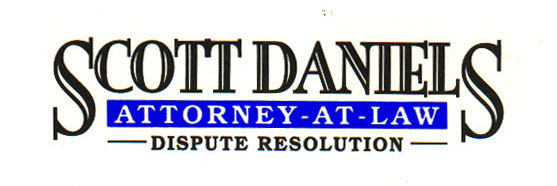Scott Daniels
P.O. Box 521328
Salt Lake City, UT 84152

Arbitration Protocol
SCOTT DANIELS, Arbitrator
At least two weeks prior to the hearing, submit a list of witnesses and exhibits to the other side with a copy to the Arbitrator. If possible agree to the exhibits so that only one copy need be submitted. Keep in mind that almost any relevant document is usually admitted in arbitration without technical foundation, and objections to admissibility are seldom successful unless there is a substantial issue as to the authenticity of a document.
Prior to the hearing, both sides are entitled to submit a pre-hearing statement. This should be in the Arbitrators hands at least three days prior to the hearing. This is not intended to be a complex legal brief; rather it should be a short statement of the facts of the case. If you choose to submit a statement, mail a copy to the other side at the same time.
Unless the parties agree otherwise, the hearing will be governed by the American Arbitration Association Commercial Arbitration Rules and Mediation Procedures (these can be obtained online at: adr.com).
An arbitration proceeding follows generally the same order and manner as a trial, except it is less formal, and usually shorter. It begins with the claimant or the claimant’s attorney making an opening statement. The Respondent may make an opening statement immediately following the Claimant’s, or may wait until after the Claimant has completed his case. This is also the time when Motions or procedural matters are handled. Usually, both sides offer all of their exhibits at this time.
The Claimant then calls his witnesses, questions them, and the Respondent cross-examines. Strict rules regarding cross-examining within the scope of the direct are not followed, so that witnesses will not have to be recalled.
Following the Claimant’s case, the Respondent calls any additional witness he may have, and the Respondent cross-examines. Evidence can be admitted by affidavit, over the telephone, or even by letter. Only the grossest hearsay is usually excluded. Almost all relevant evidence is admitted, with most objections going to weight.
The Claimant is entitled to give a closing statement, followed by the Respondent, with the Claimant having a final rebuttal. At this time the hearing is declared closed. If either party wishes to submit post-hearing briefs, then both parties will be entitled to the same opportunity. If there are post-hearing briefs, the due dates will be set at the time of the hearing. Each side will submit two copies to the arbitrator, one of which will be placed into a stamped envelope, pre-addressed to the opposing attorney, and the arbitrator will mail the copies to each side. No reply brief will be allowed.
The Arbitrator will issue a written award within 14 days from the time the hearing is closed, unless there are post-hearing briefs, in which case the award will be issued within 14 days from the date the last brief is received and the copies are mailed to the parties.
If a subpoena is needed to secure the attendance of a witness, the Arbitrator will be happy to sign one.
The Arbitrator will place all of the witnesses under oath.
If either side desires to have a record, he should arrange for a reporter.
There should be no ex-parte contact relevant to the merits with the Arbitrator. Conversations relating only to scheduling are permissible, but only with the knowledge and consent of the opposing party.
All correspondence sent to the arbitrator should be copied to the opposing party.
If you have any questions, call me on a conference call with the opposing side.
I’m sure that you will find that Arbitration is faster, less expensive and less painful than litigation. I’m looking forward to seeing you.
Very truly yours,
Scott Daniels
Arbitrator